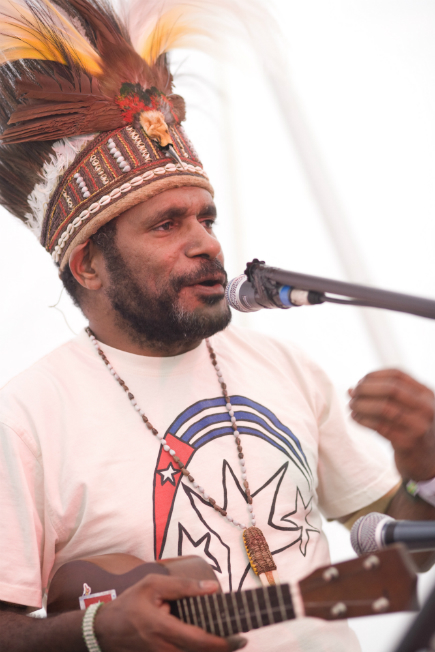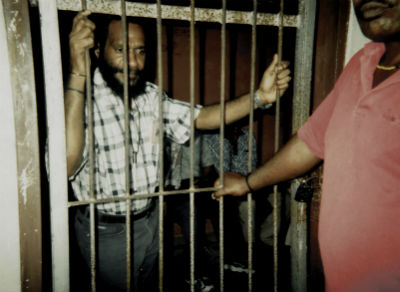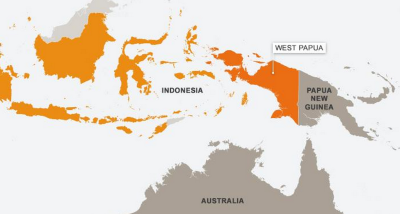Background
 Benny Wenda is a West Papuan independence leader, International Spokesman for the United Liberation Movement for West Papua (ULMWP), and founder of the Free West Papua Campaign. He lives in exile in the United Kingdom. In 2003 he was granted political asylum by the British Government following his escape from custody while on trial in West Papua.
Benny Wenda is a West Papuan independence leader, International Spokesman for the United Liberation Movement for West Papua (ULMWP), and founder of the Free West Papua Campaign. He lives in exile in the United Kingdom. In 2003 he was granted political asylum by the British Government following his escape from custody while on trial in West Papua.
In 2003, Benny Wenda got off a plane at London’s Heathrow Airport and took his first steps into a new world. A few months previously he had been on trial in Indonesia, facing a sentence of 25 years. But a daring prison escape followed by a three week trek through the jungle had guaranteed his freedom, and with the help of activists he was now on the other side of the world.
Since that day, the West Papua independence leader has fought a campaign from exile to bring the voice of his people to the world. Filmed over a two year period, The Road to Home provides a rare glimpse into the life of Benny Wenda.
Early life
As a young child in the 1970s, Benny Wenda’s world was his village in the remote highlands of West Papua. Life consisted of tending gardens with his mother among the Lani people. In 1977 that life changed dramatically when the Indonesian military appeared in his village. Often the soldiers would force the women to wash themselves in the river before brutally raping them in front of their children. Many young women, including three of Benny’s aunties, died in the jungle from the trauma and injuries inflicted during these attacks, which often involved genital mutilation.
Later that year, and in response to military violence towards Papuans, 15,000 Lani people rebelled. In retaliation, Indonesian military aircraft bombed many Lani villages in the highlands, including Benny’s village.
Events such as these drove Benny to take on a leadership role in the Papuan community. His motivation sprang not from politics, but from the desire to assert and celebrate Papuan identity, and to encourage other Papuans to do the same. Benny went on to complete a degree in sociology and politics in Jayapura. While at university, he initiated discussion groups for Papuan students in Jayapura – of all ages and from all tribes from both the highlands and coastal regions – so they could come together and talk about what it was to be Papuan. Above all, Benny wanted to change the mindset of Papuan children, children who had been brought up being told they were primitive, dumb and dirty, to teach them that they should be proud of being Papuan.
Demmak and the ‘Papuan Spring’
After the fall of Suharto, the relaxation of military control and the independence of East Timor in 1999, demonstrations and flag raisings occurred across Papua, with Papuans demanding their own referendum on independence. In the period between 1999 and 2000, known as the ‘Papuan Spring’, Jakarta held dialogue with Papuan leaders and the Presidium of the Papuan Council (PDP) was formed to represent the Papuan nationalist movement and to negotiate Papua’s future.
It was during this period that Benny became leader of Demmak (Dewan Musyawarah Masyarakat Koteka), the Koteka Tribal Assembly. Demmak was established by tribal elders with the goal of working towards recognition and protection of the customs, values and beliefs of the tribal people of West Papua. It advocates independence from Indonesia, and rejects special autonomy or any other political compromise offered by the Indonesian government. As Secretary-General of Demmak, Benny represented the council of elders. The organisation supported PDP negotiations with Jakarta to the extent that they represented the aspiration of the Papuan people, which was independence from Indonesia.
But when Megawati became President in July 2001 policy on Papua changed. A compromised version of special autonomy was the only politically viable option. The Papuan Spring was over and the military crackdown on known ‘separatists’ began. In November 2001, Theys Eluay, leader of the PDP, was assassinated by soldiers. But Benny stood firm to Demmak’s aim: full independence.
Political persecution… and escape
 The political freedom to express aspirations for independence quickly evaporated. Once again, it became dangerous to support independence. Secret documents later discovered by human rights organisations named specific organisations and individuals that had to be ‘dealt with’, including the PDP and Demmak. On 6 June 2002 Benny was arrested and detained in Jayapura. His home was ransacked without a warrant and the police refused to inform him of the charges brought against him.
The political freedom to express aspirations for independence quickly evaporated. Once again, it became dangerous to support independence. Secret documents later discovered by human rights organisations named specific organisations and individuals that had to be ‘dealt with’, including the PDP and Demmak. On 6 June 2002 Benny was arrested and detained in Jayapura. His home was ransacked without a warrant and the police refused to inform him of the charges brought against him.
He was tortured by police and held in solitary confinement for several months. Sometime later he was charged with inciting an attack on a police station and burning two shops in the small township of Abepura on 7 December 2000, which left a policeman and a security guard dead. It seemed like Benny would be set to spend a life behind bars, until the night he escaped from prison and fled to exile.
Background to West Papua
Swathed in tropical rainforest which is second in size only to those of the Amazon, West Papua is home to many unique species of wildlife including tree kangaroos and beautiful birds of paradise. It is also one of the world’s most resource rich areas containing huge reserves of oil, gas, copper, gold and timber.The indigenous population number about 1 million Melanesian Papuans, many of whom still live subsistence or hunter gatherer tribal lifestyles. The diverse tribes of New Guinea speak some 15% of the world’s known languages, despite having less than 3% of the world’s population.
 Previously a Dutch colony along with the islands that now make up Indonesia, West Papua remained under Dutch control when the Republic of Indonesia became an independent nation state in 1949. The Dutch government began preparing West Papua for independence throughout the 1950s. At the end of 1961, West Papua held a Congress at which its people declared independence, and raised their new flag – the Morning Star.
Previously a Dutch colony along with the islands that now make up Indonesia, West Papua remained under Dutch control when the Republic of Indonesia became an independent nation state in 1949. The Dutch government began preparing West Papua for independence throughout the 1950s. At the end of 1961, West Papua held a Congress at which its people declared independence, and raised their new flag – the Morning Star.
Within months the dream was dead: the Indonesian military invaded West Papua and conflict broke out between the Netherlands, Indonesia and the indigenous population regarding control of the country. The US intervened and engineered an agreement between Indonesia and the Netherlands, which in 1962 gave control of West Papua to the United Nations and one year later transferred control to Indonesia. The Papuans were never consulted. However, the agreement did promise them their right to self determination – a right which is guaranteed by the UN to everyone on Earth.
Act of No Choice
By 1969 there was widespread resistance to Indonesian rule. The Indonesian military had killed and imprisoned thousands of Papuans in the seven years it had occupied the country – yet it was under these conditions that the people were supposed to exercise their right to self determination. It was agreed that the UN should oversee a plebiscite of the people of West Papua, in which they would be given two choices: to remain part of Indonesia or to become an independent nation once again. This vote was to be called the ‘Act of Free Choice.’
But the Act was a sham. Instead of overseeing a free and fair election, the UN stood by while Indonesia rigged the vote. Declaring that the Papuans were too ‘primitive’ to cope with democracy, the Indonesian military hand-picked just 1,026 ‘representative’ Papuans – out of a population of one million – threatened to kill them and their families if they voted the wrong way, and then told them to choose. The result was ‘unanimous’: West Papua would remain part of Indonesia. Despite protests from the Papuans, a critical report by a UN official and condemnation of the vote in the international media the UN sanctioned the result and West Papua has remained under control of the Indonesian state ever since.
—
Full version of the film available to watch on DVD.
